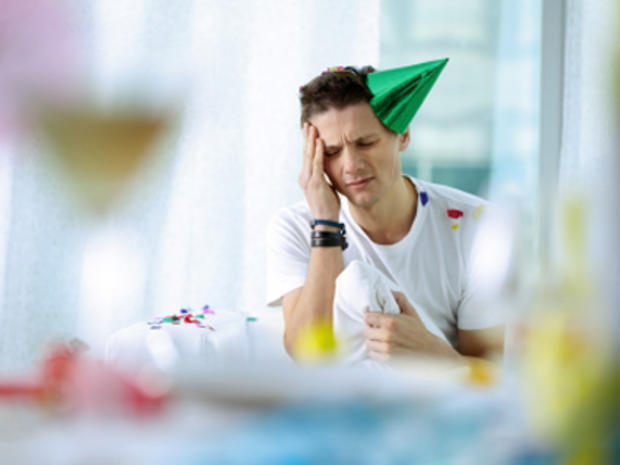Science of booze: How to minimize your New Year's hangover
After raising a glass on New Year’s Eve, it’s possible you might get a little carried away with the festivities. In case you do, CBS News medical contributor Dr. David Agus joined “CBS This Morning” to discuss the science behind hangovers and how to ease the pain.
Agus explained that a hangover is not a singular reaction to alcohol, but is instead caused by multiple processes happening in your body at once.
“When you drink alcohol, your body metabolizes the acetaldehyde (a chemical created when alcohol is broken down by the liver) and that builds up in the body and doesn’t make you feel good,” he said. “Alcohol is a diuretic, so every glass of alcohol you drink, you pee out three to four times that much, so you dehydrate yourself.”
Agus also explained that alcohol itself is a depressant, so drinking the beverage will make you tired. But when you fall asleep you’ll eventually get a rebound in energy from a hormone called epinephrine (adrenaline), which he says, “will screw up your sleep.”
The doctor told the co-hosts that the best way to a cure a hangover is to avoid it by not drinking, but there are some liquors that are worse offenders than others.
“Congeners are something that’s in liquors -- especially the colored ones,” he said. “So, you have more of a chance of a hangover with the colored liquors. For example, bourbon and scotch are worse than vodka. Red wine, a little bit worse than white.”
While you should watch what you drink and how much you drink, Agus also said you need to drink “lots of fluids” beforehand to prevent a hangover. He suggested sports drinks, coconut water and regular water as the best types of fluids. He said you could also take a pain reliever.
“Maybe take some aspirin or some ibuprofen, both of which can block the inflammatory components of what happens when you drink alcohol,” he said. “You may want to avoid Tylenol, because alcohol and Tylenol are double whammy on the liver.”
For those who are older, unfortunately, hangovers are worse, as is the impact of liquor on the body.
“As we all get older, we don’t metabolize alcohol as much and also, we take a lot of other medicines as we get older and alcohol can interfere with those medicines,” he said. “Alcohol can also have an effect on the heart, so as you get older, we want to drink a little bit less and try to avoid those binges that can cause a hangover.”
